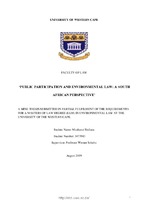| dc.description.abstract | The Constitution of the Republic of South Africa ‘despite being one of the world’s most liberal
constitutions, South Africans still have no transparent and participatory mechanisms for
deciding democratically on the uptake of new technologies or development projects, even those
which impact on millions of lives and livelihoods. There are limited opportunities for
intervention in very circumscribed public participation processes, which are often derisory in
the sharing of any sovereignty with citizens in the name of producing better public policy.
When citizens are left out of debates confined to government and the business community, the
only means of influencing policy is to petition, protest, or litigate, usually after the horse has
bolted.’ Public participation is a very delicate issue in South Africa due to the history of the
exclusion of certain people from the process of governance. When governments and business
sectors make decisions about land development and natural resources, they certainly impact on
the health, livelihoods and quality of life of local communities. | en_US |

